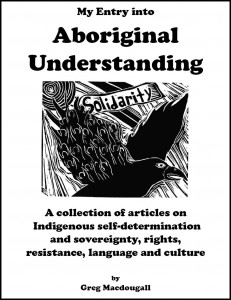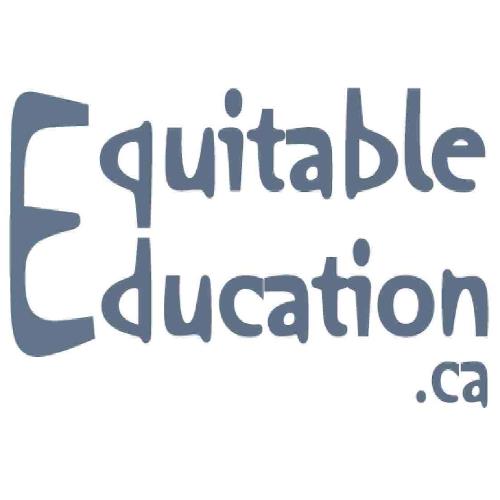 “My Entry into Aboriginal Understanding” booklet
“My Entry into Aboriginal Understanding” booklet
A collection of articles on Indigenous self-determination and sovereignty, rights, resistance, language and culture — all put together in a booklet form for better reading, and also in order to share in the physical world. In two PDF versions (for either front-to-back reading, or formatted to print doublesided and fold into booklet form).
Other articles:
- Coordinating Conversation: Niigaan looks to build Indigenous/non-Indigenous relations and learning
– Includes audio interview with Niigaan organizers, and video of the event itselfNiigaan: In Conversation is a grassroots project that brings Indigenous and non-Indigenous peoples together for dialogue and discussion through workshops and symposiums. The most recent Niigaan event was the Odawa Community Talk-Show on Sept 15.
The name Niigaan is an Anishinaabemowin word that the organizers chose to represent the themes of “at the front,” “leading,” or “looking towards the future.”
- The Sixties Scoop videos of speakers
– The Sixties Scoop was a period of Canadian child welfare policy during which an estimated 16,000 Indigenous children were removed from their homes and adopted into non-Indigenous homes.
- On the loss of the National Aboriginal Health Organization
– Includes video interview with CEO Simon Brascoupé.Final (former) CEO Simon Brascoupé on the work NAHO had been doing and what it will mean now that the organization has been closed due to a federal government 2012 budget funding cut decision.
- Residential Schools: Addressing a Lasting Legacy
– Includes two video interviews: with TRC Chair Murray Sinclair and with TRC Indian Residential Schools Survivors Committe member Barney Williams Jr; and a 2-pg PDF version of the article“The important thing that I do want people to understand is that this is not an Aboriginal problem, this is not just for Aboriginal people to address. The issue of the impact of residential schools upon this nation is an issue that the nation as a whole needs to address…” says Murray Sinclair, Chair of the Truth & Reconciliation Commission.
- Idle No More: On the meaning of Chief Theresa Spence’s hunger strike
Idle No More started in Saskatchewan in November, and caught on through social media. … Chief Spence started her fast as the Idle No More movement continued to gather steam. She seems to have taken the lead from the grassroots people, and in turn they have taken her lead.
- Idle No More pamphlets for printing
I’ve been working with Taiaiake Alfred to produce a pamphlet for the Idle No More movement. It’s of a piece he and Tobold Rollo have written, entitled “Resetting and Restoring the Relationship between Indigenous Peoples and Canada” and we’ve got it in three different languages.
- Vigils honour missing and murdered Aboriginal women and girls in Canada
— includes video interviews with Bridget Tolley and Kristen Gilchrist of FSIS, and with Michele Audette, president of Native Women’s Association of Canada.“It’s different when an Aboriginal girl is murdered or missing,” says Bridget Tolley of Families of Sisters in Spirit. “You know, nobody cares, it seems like. Media doesn’t care, we don’t get media coverage when this happens. We do our own searches. I don’t know why, it seems like people just don’t care about us.”
- Aboriginal Approaches to Mental Health
Notes from a presentation by Carol Hopkins, Executive Director of the National Native Addictions Partnership Foundation
- Inuit leaders talk about the lack of support to address epidemic of suicides
Inuit and non-Inuit alike marked World Suicide Prevention Day on Parliament Hill on Sept. 9 with an urgent message to government to take action against the crisis facing Inuit communities, where the suicide rate is 11 times higher than that in the rest of Canada.
- Efforts to protect the Beaver Pond Forest (also: shorter version)
Since January 31, 2011, 100-year-old trees have been cut, animals have died, and the living legacy of a potentially 10,000-year-old cultural site is being destroyed.All this is occurring despite broad-based opposition from a coalition of local residents and community associations throughout the city, Algonquin First Nations communities, and several high-profile national organizations like the Sierra Club Canada and the David Suzuki Foundation.
- Cultural Appropriation
Workshop put on by Jessica Danforth of the Native Youth Sexual Health Network.
- Local activists to face Quebec judge over Barriere Lake Algonquin highway blockades (co-written)
On March 18th, an Ottawa resident along with a co-defendant from the Algonquin community of Barriere Lake will go to trial in a Maniwaki court on charges of obstruction of justice, mischief, and assaulting a police officer. On March 31st, three other local residents will be sentenced after pleading guilty to mischeif and obstruction of justice. Their crime? Bringing attention to the fact that the governments of Quebec and Canada have not honoured their word.
Both cases stem from a series of peaceful highway blockades mounted in late 2008 by the Mitchikanibikok Inik (Algonquins of Barriere Lake, or ABL), a small First Nation community located 130 km north of Maniwaki, Quebec. Solidarity activists from Ontario and Quebec joined the Mitchikanibikok Inik in two successive blockades of Highway 117, which were staged to protest the provincial and federal governments’ ongoing violation of an agreement signed with ABL over a decade ago.
- Indigenous Sovereignty Week builds community-based resistance
In November of 2008, Indigenous activists and allies from across Canada came together in Winnipeg to form Defenders of the Land, a network of Indigenous communities and activists in land struggle across Canada.
Out of this network came a call for a pan-Canadian event, Indigenous Sovereignty Week, which is now upon us. Close to 30 cities and communities across Canada (and even a few in the United States) will be holding public events from Oct. 24 to Nov. 1.
The purpose of this week is to build local relationships between groups and individuals, disseminate ideas and generally contribute to building a cross-Canada movement for Indigenous rights, self-determination, and justice that is led by Indigenous communities but with a broad base of informed support.
Guest Posts:
Anishnaabemowin (Ojibwe) Language Book
The author, Gordon Shawanda, has given permission to make this book available here (and on the IPSMO site) for download at no cost for all aspiring students of Anishnaabemowin (Ojibwe language). It is divided into 18 lessons/themes.
Kristen Gilchrist writing about her experiences as a settler ally in movement(s) to end violence(s) against Indigenous women and girls
Decolonization For Your Momma – A Workshop Tool for #IdleNoMore
Topics and discussion questions for use in decolonization workshops, from Clayton Thomas-Muller
Examining and Reflecting Upon Decolonization and Indigenous Solidarity Work
A series of themes and questions from research Craig Fortier
Grandfather’s Pipe: Grandfather William Commanda
Pipe ceremony teachings and more; in honour of the 100th anniversary of his birth
Videos:
Algonquins of Barriere Lake – Dec 13, 2010
Fight for Self-Determination and Environmental Protection
Tanya Tagaq at Women’s Worlds 2011
Andrea Smith at Women’s Worlds 2011
Storytelling, with Jani Lauzon
Winona LaDuke media interview at PowerShift Canada 2012
Harsha Walia on Anti-Oppression, Decolonization and Responsible Allyship
Algonquin Elder Albert Dumont – On Holding Circles, Prayers and Pipes
Niigaan: In Conversation – Odawa Community Talk Show – Sept 15, 2013
Seven guests discussing Indigenous-settler relations, Indigenous naming, the Nepean Redskins name, and what decolonization means. Length: 1hr. Speakers (left-right): Jennifer Adese, Alexa Lesperance, Neal Freeland, Ed Bianchi, Jean-Luc Fournier, Ian Campeau, Qajaq Robinson. Host: Darren Sutherland.
 Interdependent media & in-person learning opportunities for those who are inspired to be part of movements for social justice.
Interdependent media & in-person learning opportunities for those who are inspired to be part of movements for social justice.